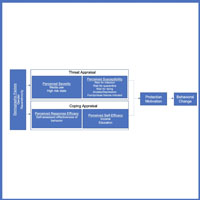Age differences in the relationship between threatening and coping mechanisms and preventive behaviors in the time of COVID-19 in the United States: Protection Motivation Theory

Submitted: August 8, 2020
Accepted: November 27, 2020
Published: January 14, 2021
Accepted: November 27, 2020
Abstract Views: 5662
PDF: 976
HTML: 29
HTML: 29
Publisher's note
All claims expressed in this article are solely those of the authors and do not necessarily represent those of their affiliated organizations, or those of the publisher, the editors and the reviewers. Any product that may be evaluated in this article or claim that may be made by its manufacturer is not guaranteed or endorsed by the publisher.
All claims expressed in this article are solely those of the authors and do not necessarily represent those of their affiliated organizations, or those of the publisher, the editors and the reviewers. Any product that may be evaluated in this article or claim that may be made by its manufacturer is not guaranteed or endorsed by the publisher.
Similar Articles
- Laura Parolin, Alberto Milesi, Giovanni Comelli, Francesca Locati, The interplay of mentalization and epistemic trust: a protective mechanism against emotional dysregulation in adolescent internalizing symptoms , Research in Psychotherapy: Psychopathology, Process and Outcome: Vol. 26 No. 3 (2023)
- Pim Cuijpers, Claudio Gentili, Psychological treatments are as effective as pharmacotherapies in the treatment of adult depression: a summary from Randomized Clinical Trials and neuroscience evidence , Research in Psychotherapy: Psychopathology, Process and Outcome: Vol. 20 No. 2 (2017)
- Francesco De Bei, Andrea Montorsi, Interaction Structure and Transferential Patterns in Brief Psychotherapy: A Single-case Study , Research in Psychotherapy: Psychopathology, Process and Outcome: Vol. 16 No. 1 (2013)
- Kanika Mehrotra, Poornima Bhola, Geetha Desai, Contextualizing motherhood in persons with borderline personality vulnerabilities: cultural adaptation of the Parent Development Interview-Revised in an Indian context , Research in Psychotherapy: Psychopathology, Process and Outcome: Vol. 26 No. 1 (2023)
- Paula Dagnino, Carola Pèrez, Adriana Gòmez, Sergio Gloger, Mariane Krause, Depression and attachment: how do personality styles and social support influence this relation? , Research in Psychotherapy: Psychopathology, Process and Outcome: Vol. 20 No. 1 (2017)
- Vera Luisa König, María Isabel Fontao, Leandro Martín Casari, Alejandra Ruth Taborda, Psychotherapists’ experiences of telepsychotherapy during the COVID-19 pandemic in Argentina: impact on therapy setting, therapeutic relationship and burden , Research in Psychotherapy: Psychopathology, Process and Outcome: Vol. 26 No. 1 (2023)
- Claudia Prestano, Viviana Cicero, Salvatore Gullo, Grazia Alcuri, Gianluca Lo Coco, Antonino Carcione, Le funzioni metacognitive nei pazienti con disturbi del comportamento alimentare. Uno studio sul trattamento di gruppo psicodinamico , Research in Psychotherapy: Psychopathology, Process and Outcome: Vol. 12 No. 1-2 (2009)
- Sabine van Thiel, Margot C.W. Joosen, Anne-Linde Joki, Arno van Dam, Jac J.L. van der Klink, Kim de Jong, Psychometric analysis of the Dutch language Facilitative Interpersonal Skills (FIS) video clips , Research in Psychotherapy: Psychopathology, Process and Outcome: Vol. 24 No. 1 (2021)
- Diego Rocco, Rachele Mariani, Diego Zanelli, The Role of Non-Verbal Interaction in a Short-Term Psychotherapy: Preliminary Analysis and Assessment of Paralinguistic Aspects , Research in Psychotherapy: Psychopathology, Process and Outcome: Vol. 16 No. 1 (2013)
- Research Group for treatment for Anxiety and Depression, Psychotherapies for Anxiety and Depression: benefits and costs , Research in Psychotherapy: Psychopathology, Process and Outcome: Vol. 20 No. 2 (2017)
<< < 12 13 14 15 16 17 18 19 20 21 > >>
You may also start an advanced similarity search for this article.

 https://doi.org/10.4081/ripppo.2020.485
https://doi.org/10.4081/ripppo.2020.485





